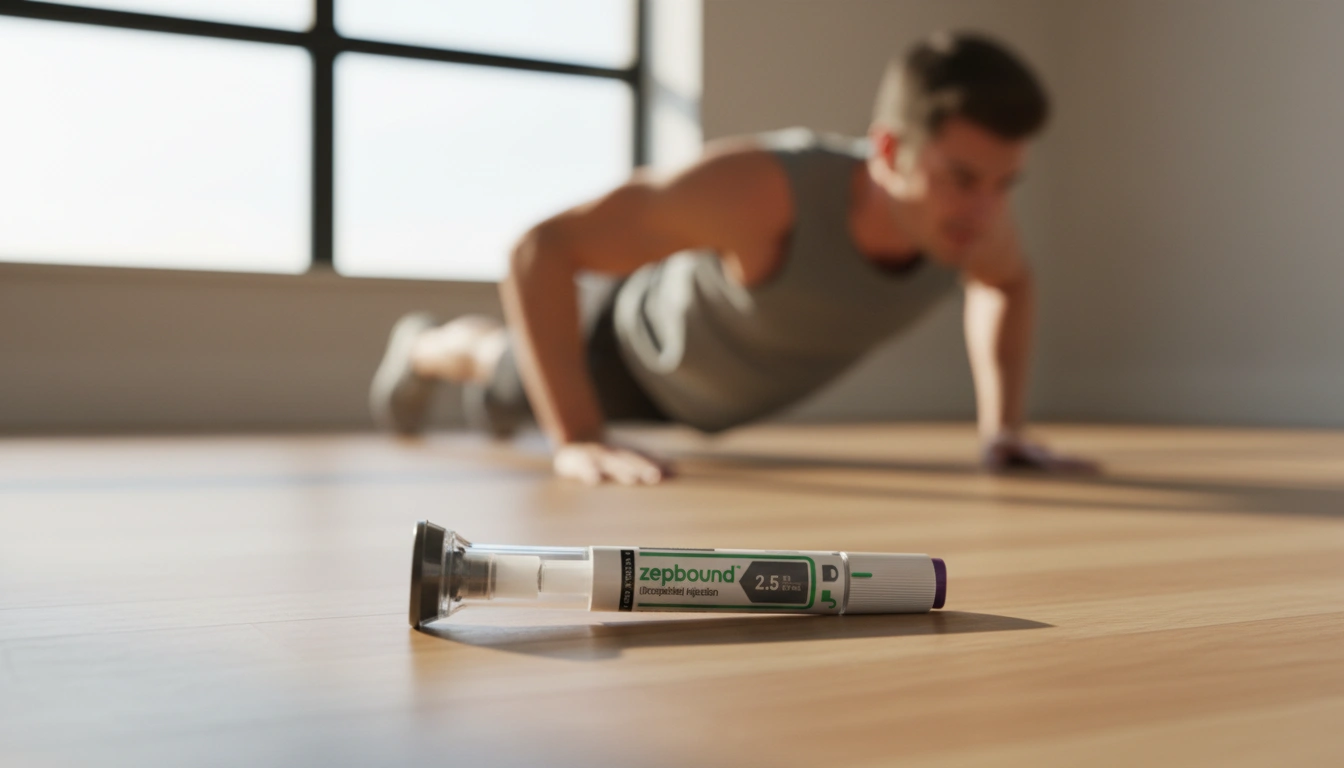Why Am I Not Losing Weight on Zepbound 2.5?

When embarking on a weight loss journey, one may envision a straightforward path toward shedding excess pounds. However, many individuals find themselves asking, "Why am I not losing weight on Zepbound 2.5?" This question resonates with many who have turned to this innovative medication in hopes of achieving their weight loss goals. Zepbound (tirzepatide) has garnered attention since its FDA approval for weight management, yet individual experiences can vary significantly.
In this blog post, we will delve into the multifaceted reasons that may hinder weight loss while using Zepbound, particularly in its initial 2.5 mg dosage. We will explore the medication's mechanism, the importance of lifestyle factors, potential hurdles that may arise, and strategies to optimize your weight loss journey. By the end, we hope to equip you with insights and actionable steps to enhance your experience on Zepbound and move closer to your health goals.
Introduction
The journey of weight loss can often feel like navigating a complex maze, filled with unexpected turns and obstacles. Zepbound, a medication designed to assist individuals in managing their weight, has emerged as a beacon of hope for many. However, despite the promise of this treatment, some may find themselves frustrated with their progress—or lack thereof.
Recent studies indicate that Zepbound can lead to substantial weight loss, with some participants shedding significant amounts over time. But what happens when the expected results don’t materialize? Understanding the underlying reasons for this can empower you to make informed decisions about your health.
In this article, we will cover:
- How Zepbound works: A look into the science behind this medication.
- Common reasons for stalled weight loss: Factors that may impede your progress on Zepbound.
- Lifestyle factors and their impact: How diet and exercise can complement your treatment.
- When to consult a healthcare provider: Understanding the signs that it may be time for a conversation about your treatment.
We encourage you to reflect on your own journey and consider how these insights might apply to your experience with Zepbound.
How Zepbound Works
Zepbound (tirzepatide) functions as a dual agonist, targeting two key hormone receptors: GLP-1 (glucagon-like peptide-1) and GIP (glucose-dependent insulinotropic peptide). Both of these hormones play critical roles in regulating appetite and glucose metabolism.
Upon administration, Zepbound mimics these hormones, promoting feelings of satiety and reducing hunger. This allows individuals to consume fewer calories while still feeling satisfied, which is essential for effective weight management. It’s worth noting that Zepbound is intended to be used in conjunction with a reduced-calorie diet and increased physical activity for optimal results.
Here’s a closer look at how Zepbound works in the body:
- Appetite Suppression: By activating GLP-1 and GIP receptors, Zepbound helps to signal fullness to the brain, reducing the urge to snack or overeat.
- Slowed Gastric Emptying: The medication slows the rate at which food leaves the stomach, extending feelings of fullness after meals.
- Enhanced Insulin Sensitivity: Zepbound promotes insulin secretion, which can help regulate blood sugar levels, particularly beneficial for those with insulin resistance.
While these mechanisms can lead to significant weight loss for many, individual responses to the medication can vary widely.
Common Reasons for Stalled Weight Loss on Zepbound
If you're taking Zepbound and not seeing the weight loss results you hoped for, several factors may be at play:
1. Dosage Adjustments are Needed
Zepbound treatment typically begins at a lower dose of 2.5 mg, which is gradually increased over time. This initial low dose allows your body to adjust to the medication. If you find that weight loss is slow or nonexistent, it may be due to the dosage not being high enough for your individual needs. Consult with your healthcare provider about potentially increasing your dose to achieve better results.
2. Dietary Choices Matter
While Zepbound helps to control appetite, it does not eliminate the need for a nutritious and balanced diet. Many individuals may mistakenly believe that they can eat whatever they want due to their reduced appetite. However, consuming high-calorie or highly processed foods can hinder your weight loss progress. It’s crucial to focus on a low-calorie diet rich in whole foods, such as lean proteins, fruits, vegetables, and whole grains.
3. Physical Activity Levels
Exercise is a cornerstone of any effective weight loss plan. Though Zepbound can assist in reducing appetite, physical activity is vital for burning calories and enhancing metabolic health. A sedentary lifestyle can severely limit weight loss potential. We recommend incorporating regular exercise into your routine, including both aerobic activities and strength training, to maximize your results.
4. Natural Weight Loss Plateaus
It's common for individuals to experience weight loss plateaus, particularly after initial success. As your body adjusts to changes in diet and exercise, it may slow down weight loss temporarily. This plateau doesn't indicate that Zepbound is ineffective; rather, it reflects your body’s natural response to weight loss. Staying consistent with your treatment and making small adjustments to your routine can help overcome these plateaus.
5. Underlying Health Conditions
Certain medical conditions, such as hypothyroidism or hormonal imbalances, can impede weight loss. Additionally, some medications may counteract the effects of Zepbound, making it more challenging to lose weight. If you suspect that an underlying health issue may be affecting your progress, we recommend discussing this with your healthcare provider for further evaluation.
6. Inconsistent Medication Adherence
Zepbound is most effective when taken consistently as prescribed. Skipping doses or not following the recommended schedule can lead to reduced efficacy. It's essential to adhere to your medication regimen and attend follow-up appointments to monitor your progress effectively.
Lifestyle Factors and Their Impact
While Zepbound is a powerful tool in the weight loss journey, it works best when combined with healthy lifestyle changes. Here are some key lifestyle factors to consider:
Nutrition
A healthy diet plays a pivotal role in weight loss. Here are some tips to enhance your nutritional choices while on Zepbound:
- Focus on Whole Foods: Prioritize fruits, vegetables, lean proteins, and whole grains. These foods are nutrient-dense and can help keep you feeling full.
- Watch Portion Sizes: Even with decreased appetite, it's essential to be mindful of portion sizes to avoid overeating.
- Plan Meals Ahead: Meal prepping can help you make healthier choices and avoid impulse eating.
Exercise
Incorporating physical activity into your routine can significantly enhance the effectiveness of Zepbound. Consider the following:
- Aim for Regular Activity: The CDC recommends at least 150 minutes of moderate-intensity aerobic exercise each week. This can be broken down into manageable sessions.
- Strength Training: Including strength training exercises at least twice a week can help preserve muscle mass and boost metabolism.
- Stay Active Throughout the Day: Find opportunities for movement beyond structured workouts, such as taking the stairs or going for a walk during breaks.
Sleep and Stress Management
Sleep and stress can also influence weight loss. Lack of sleep can lead to hormonal imbalances that increase appetite, while stress may trigger emotional eating. Prioritizing adequate rest and implementing stress reduction techniques, such as mindfulness or yoga, can help support your weight loss efforts.
When to Consult a Healthcare Provider
If you continue to struggle with weight loss despite following a comprehensive plan, it may be time to consult your healthcare provider. They can assess your current treatment plan, review your medical history, and explore potential adjustments. Here are some signs that warrant a discussion with your provider:
- Lack of Progress: If you have not lost any weight after several weeks on Zepbound, it’s essential to evaluate your approach.
- Health Concerns: If you suspect an underlying health condition may be impacting your weight loss, discussing this with your provider is crucial.
- Side Effects: If you experience side effects that interfere with your ability to take the medication consistently, your provider can offer solutions.
Final Thoughts
Navigating the journey of weight loss on Zepbound can be complex, but understanding the various factors at play can empower you to make informed decisions. While Zepbound has shown promise for many individuals, achieving sustainable results requires a holistic approach that includes dietary changes, physical activity, and consistent medication adherence.
As you reflect on your own experience with Zepbound, consider how these insights may apply to your journey. We encourage you to engage with our free assessment quiz to determine your eligibility for personalized weight loss programs tailored to your needs.
At TrimRx, we believe in providing compassionate care that supports every individual's unique journey. Whether you're just beginning your weight loss journey or seeking ongoing support, we are here to help you achieve your goals.
FAQ
How quickly will I start to see weight loss results on Zepbound?
Most individuals begin to see some weight loss within a few weeks of starting treatment; however, significant changes often occur after several months.
Will I lose weight on the 2.5 mg dose of Zepbound?
While 2.5 mg is the starting dose, many individuals may need to increase their dosage to achieve optimal results. It’s crucial to consult with your healthcare provider about your progress.
How important is diet when taking Zepbound?
Diet is essential for maximizing weight loss results. Combining Zepbound with a balanced, low-calorie diet will enhance your chances of success.
Can I exercise while on Zepbound?
Absolutely! Regular exercise is encouraged and can significantly improve weight loss outcomes when combined with Zepbound.
What should I do if I hit a weight loss plateau?
Plateaus are common during weight loss. Maintaining consistency with your medication, making small adjustments to your diet or exercise, and consulting with a healthcare provider can help you overcome these challenges.
By addressing these questions and considering the information shared, you can take proactive steps toward achieving your weight loss goals with Zepbound. Remember, you are not alone on this journey, and together, we can navigate the path to healthier living.

Transforming Lives, One Step at a Time
Keep reading
Navigating Your Path: How Many Doses Are In Zepbound and What It Means for Your Health Journey
Curious how many doses are in Zepbound? Discover its weekly dosing schedule, available strengths, and titration process for effective weight loss. Learn more!
Navigating Your Zepbound Journey: Understanding Dosing and Expert Guidance
Wondering how to split doses of Zepbound? Learn why it’s unsafe & not recommended. Get expert guidance on Zepbound dosing for safe, effective weight loss with TrimRx. Click to learn more!
Understanding Zepbound Dosing: What is the Lowest Dose Available for Your Weight Loss Journey?
Curious what is the lowest dose of Zepbound available? Learn about Zepbound’s 2.5mg starting dose, titration, and safe use for weight loss. Get expert guidance!



